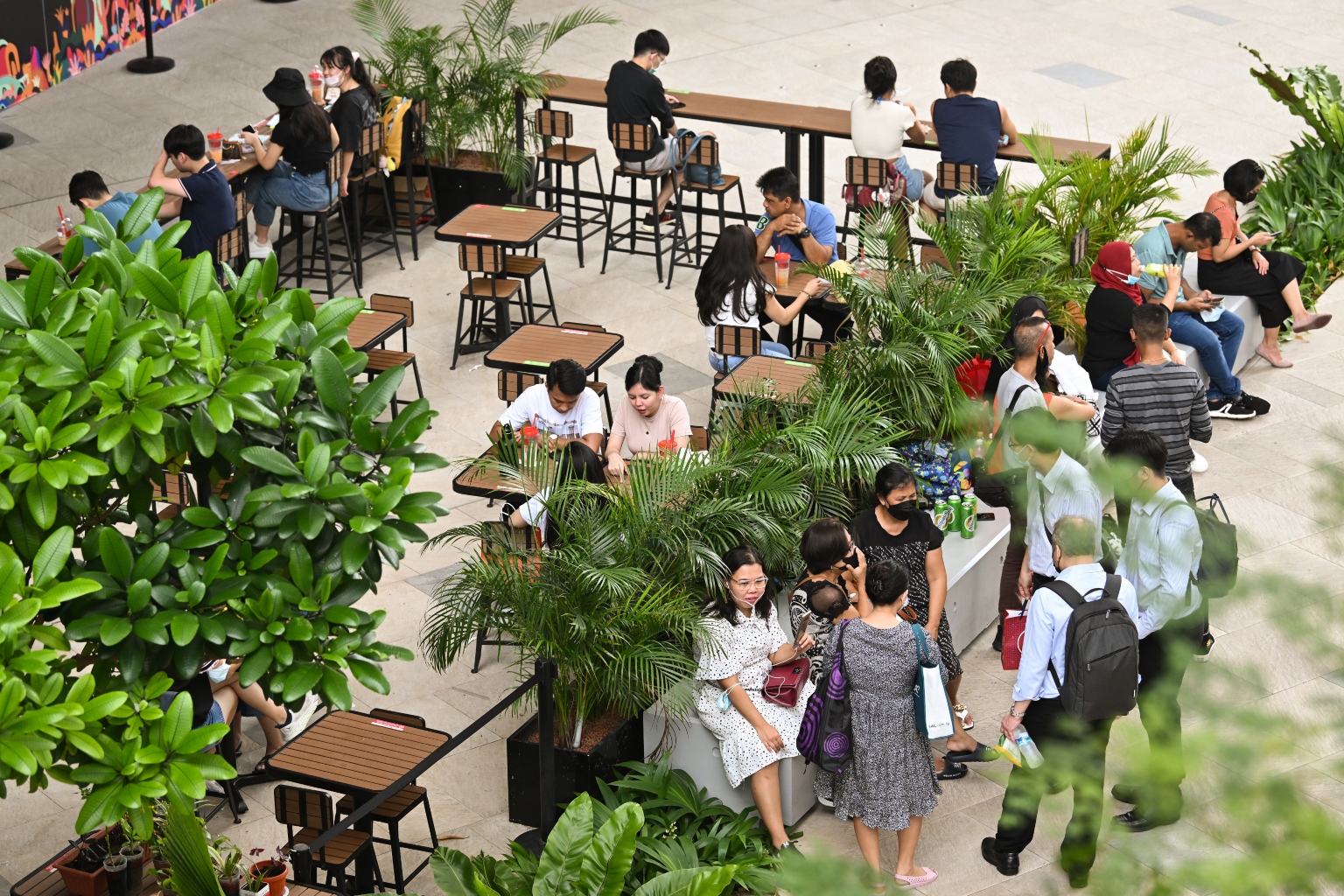Singaporeans ready to rein in spending as they see high inflation persisting: Survey
Sign up now: Get ST's newsletters delivered to your inbox

People dining and socialising outside PLQ Mall in Paya Lebar on a Sunday earlier this month.
ST PHOTO: LIM YAOHUI
Follow topic:
SINGAPORE - With prices of goods and services rising at their fastest pace in a decade, consumers in Singapore are ready to rein in spending of their hard-earned cash, a survey conducted by DBS Bank found.
Most of the survey respondents said they would prioritise spending on household necessities such as groceries, utilities and dining out. Meanwhile, shopping, recreation and travel ranked among their lowest priorities.
Although Singapore's consumer price index (CPI) rose by 5.4 per cent year on year in April, more than half of the survey respondents felt their cost of living has shot up by more than 10 per cent.
DBS said the perception of higher expenses versus the average cost represented by the CPI basket could have been driven by the double-digit increases in utilities and transport costs in recent months.
Expectations that prices will remain high were also running ahead of government estimates.
While the Monetary Authority of Singapore expects inflation to moderate towards the end of the year, an overwhelming majority - 81 per cent - of the consumers in the survey expect the high inflationary trend to persist over the next 12 months and beyond.
That suggests respondents are preparing for inflation to drag on for longer than what policymakers are estimating.
In response to those expectations, 74 per cent of the respondents highlighted that they will "save more, spend less" and "look for cheaper alternatives".
In addition, 64 per cent of the respondents indicated that their spending behaviour is likely to change in the face of the inflationary pressures.
DBS said both the expectation of higher prices and the indication of change in spending behaviour shows that the boost to retail after relaxation of Covid-19 curbs early this year may only last for another couple of months beyond April.
Retail sales jumped by 12.1 per cent in April, faster than the growth of 8.8 per cent in the month before, according to Department of Statistics data.
Most economists believe that, while the reopening momentum has kept overall growth recovery intact, higher inflation will eventually weigh down household spending and hurt business confidence.
"Consumer demand in Asia is chugging along due to an improving labour market and reopening tailwinds, but the rising cost of living will become a headwind for households with smaller savings buffers," Japanese investment bank Nomura International said in a recent research report.
The DBS survey showed that most consumers will cut consumption and go for cheaper alternatives when it comes to comfort items such as branded food items, chocolates, alcohol and snacks.
For recreation and overseas travel, consumers signalled a preference of quality over quantity, and will opt to reduce frequency rather than look for cheaper alternatives, DBS said.
This could be a result of pent-up demand after movement and travel restrictions in the past two years, the bank said.
Singaporeans’ relatively lower travel frequency was also highlighted by a recent survey by online travel company Booking.com. Singapore ranked sixth in Booking.com's Apac Travel Confidence Index, behind India, Vietnam, China, Australia and New Zealand.
According to that survey, most Singaporeans were concerned about the possibility of getting stuck at the destination, and would rather take trips of up to eight hours to popular holiday destinations closer to home, such as Thailand and Indonesia.
DBS garnered 201 responses in the last week of May for its survey.
Respondents were evenly mixed in gender and across age groups but with the majority employed (80 per cent) or self-employed (7 per cent). The remainder were retirees (6 per cent), students (4 per cent) and housewives (3 per cent).

